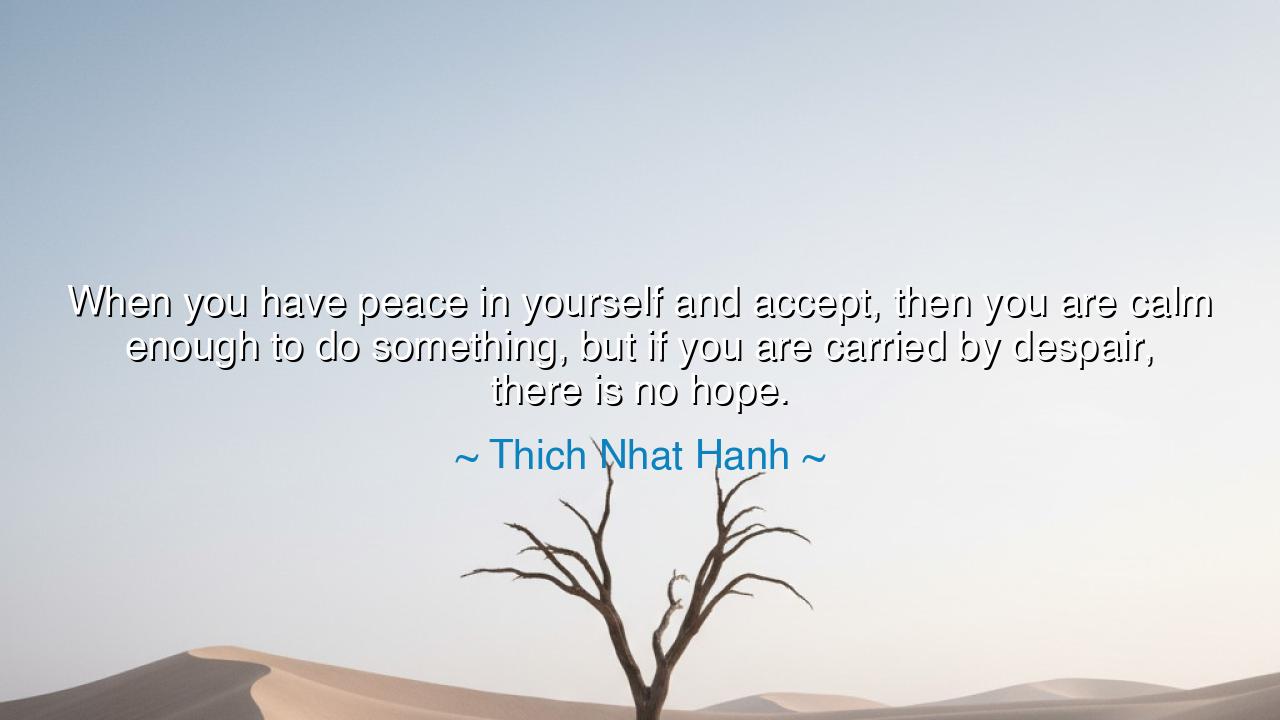
When you have peace in yourself and accept, then you are calm
When you have peace in yourself and accept, then you are calm enough to do something, but if you are carried by despair, there is no hope.






“When you have peace in yourself and accept, then you are calm enough to do something, but if you are carried by despair, there is no hope.” Thus spoke Thich Nhat Hanh, the gentle monk of Vietnam, whose words, like the still water of a mountain lake, reflect both the sorrow and the wisdom of a life lived in mindfulness. In these few simple lines, he offers not merely comfort but a map for survival — a way to act wisely amid chaos, to find light in the heart of darkness. For he teaches that peace is not the absence of struggle, but the inner stillness that allows right action to arise. Without it, we drown in our own despair, unable to help ourselves or others.
Thich Nhat Hanh’s words were born from the fire of war and suffering. During the Vietnam War, when villages burned and families were torn apart, he refused to choose sides of hatred. Instead, he walked the middle path — the way of compassion. He tended to the wounded, sheltered orphans, and called both North and South to lay down their arms. For such courage, he was exiled from his homeland for nearly forty years. Yet in that exile, his message only grew stronger: that true peace begins within. A mind at war cannot heal the world; only one that has accepted the reality of pain and embraced it with understanding can do so.
The power of this teaching lies in its paradox. Many believe that when the world burns, anger is necessary to change it — that despair itself is the proof of compassion. But Thich Nhat Hanh saw deeper. Despair paralyzes, he said; it blinds the heart and consumes the will. It is like a stormy sea — no vessel can steer upon it. Only when the waters within are calm can one see the horizon, and only then can one act with clarity. Thus, he calls us not to numbness, but to mindful acceptance — the courage to face reality as it is, neither clinging nor fleeing, and from that acceptance, to act with wisdom and love.
Consider the story of Nelson Mandela, imprisoned for twenty-seven years for daring to dream of equality. He could have been consumed by bitterness, but he refused. He found peace within his captivity, turning his cell into a monastery of reflection and patience. When he was finally freed, he emerged not as a man of vengeance, but of forgiveness. His calm became his power, his serenity the weapon that conquered hate. Like Thich Nhat Hanh, Mandela knew that to act from peace is to act from strength — but to act from despair is to destroy all hope of renewal.
In the ancient scriptures, it is written that the Buddha himself, before his enlightenment, sat beneath the Bodhi tree and faced the full force of fear, temptation, and doubt. He did not run, nor did he fight. He simply accepted. In that moment of stillness, he saw that peace was not something to be gained from the world — it was already within, waiting to be remembered. From that realization, compassion flowed outward like a river, touching all beings. So too does Thich Nhat Hanh remind us: peace is not the reward of action; it is the foundation of right action.
To “accept” does not mean to surrender to injustice or to be indifferent to suffering. It means to see clearly without hatred, to breathe amid the flames without losing yourself to them. Only then can your actions spring from understanding, not from fear. A heart filled with despair seeks only to destroy what it hates, but a heart grounded in peace seeks to heal what is broken. Peace, therefore, is not weakness; it is the source of true strength, the quiet power that builds, while despair only tears down.
So, my child, take this lesson deep into your soul: when the storms of life rise, do not rush to fight the wind. Sit first in silence. Breathe. Let the waves of anger and grief settle within you, until you can see the truth clearly. From that clarity, act — and your actions will bear fruit. For as Thich Nhat Hanh teaches, a peaceful heart is the fertile soil of hope, but despair is the barren field where nothing can grow.
Therefore, walk gently through your days. When others rage, listen. When fear calls you to despair, return to your breath. Cultivate peace within yourself as a garden, and let its fragrance spread to those around you. In doing so, you will become not a warrior of violence, but a warrior of peace, proving through your life that calm is not passivity — it is mastery, and from it, hope is born anew.






AAdministratorAdministrator
Welcome, honored guests. Please leave a comment, we will respond soon